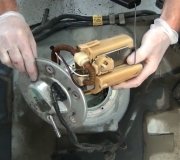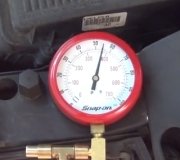Pressure is not monitored and has nothing to do with when the fuel pump runs. It runs for one second when the ignition switch is turned on, then not again until the engine computer sees engine rotation, (cranking or running). You can sit there all day with the ignition switch on, but the pump will have only run for that initial one second.
You replaced the two least likely parts to cause fuel pressure to bleed down and overlooked the most common cause. That is a leaking injector. To prove the regulator is not leaking, use a hose pinch-off pliers to pinch the rubber fuel return line where it goes from the fuel rail to the steel line on the body. I have never heard of a regulator leaking on a Chrysler product, but if it did, pinching that hose would maintain pressure in the system.
You can also pinch the fuel supply line once the engine is stopped. If that maintains the pressure, suspect the check valve in the pump. I have never run into that. The best way to find a leaking injector is to remove them still attached to the fuel rail. Turn the ignition switch on, then off, then watch to see which injector gets wet on its tip.
The long crank time is due to the battery voltage is drawn down by the starter during cranking, and that lower voltage causes the fuel pump to run slower than normal. Add to that, the injectors are spraying fuel almost as fast as the pump is supplying it. It takes a long time at that rate for the pressure to build up enough to where the engine will run. A trick to overcome that is to turn the ignition switch on, wait a few seconds, turn the switch off, wait about five seconds, turn it on again, and maybe do that a third time, then crank the engine. The pump will have run two or three seconds which is enough to get the fuel pressure high enough for the engine to run.
Thursday, September 7th, 2017 AT 2:48 PM



